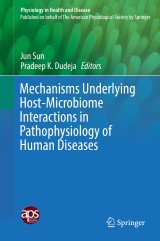Details

Mechanisms Underlying Host-Microbiome Interactions in Pathophysiology of Human Diseases
Physiology in Health and Disease
|
149,79 € |
|
| Verlag: | Springer |
| Format: | |
| Veröffentl.: | 26.01.2018 |
| ISBN/EAN: | 9781493975341 |
| Sprache: | englisch |
Dieses eBook enthält ein Wasserzeichen.
Beschreibungen
<p>Only recently have we begun to appreciate the role of microbiome in health and disease. Environmental factors and change of life style including diet significantly shape human microbiome that in turn appears to modify gut barrier function affecting nutrient & electrolyte absorption and inflammation. Approaches that can reverse the gut dysbiosis represent as reasonable and novel strategies for restoring the balance between host and microbes.</p> <p>In the book, we offer summary and discussion on the advances in understanding of pathophysiological mechanisms of microbial host interactions in human diseases. We will not only discuss intestinal bacterial community, but also viruses, fungi and oral microbiome. Microbiome studies will facilitate diagnosis, functional studies, drug development and personalized medicine. Thus, this book will further highlight the microbiome in the context of health and disease, focusing on mechanistic concepts that underlie the complex relationships between host and microbes.</p>
Impact of microbes on the intestinal development of the preterm infant.- Microbiome: Allergic Diseases of Childhood.- Pathogenesis, immunity and the role of microbiome/probiotics in enteric virus infections in humans and animal models.- Enteric bacterial regulation of the Wnt/β-catenin signaling.- Mechanism underlying beneficial role of probiotics in diarrheal diseases: host-microbe interactions.- The influence of microbiota on gastrointestinal motility.- Altered microbiota and their metabolism in host metabolic diseases.- The influence of the microbiota on the etiology of colorectal cancer.- Oral microbiome: Potential link to systemic disease and cancer.- Candida albicans commensalism and human diseases.- Fecal microbiota transplants: current knowledge and future directions.- Statistical Models and Analysis of Microbiome Data from mice and human.
Dr. Jun Sun is a tenured Associate Professor at the University of Illinois at Chicago (UIC), Chicago, U.S.A. She is a Fellow of American Gastroenterological Association (AGAF). Her research interests are host-microbiome interactions in inflammation and cancer. Her key achievements include 1) characterization of the role of vitamin D receptor in regulation of gut microbiome in intestinal homeostasis and inflammation; 2) identification of dysbiosis and gut dysfunction in Amyotrophic Lateral Sclerosis (ALS); 3) identification of the role of gut bacteria in regulating intestinal stem cells, and 4) identification and characterization of the Salmonella effector protein AvrA in host-bacterial interactions in infection and cancer. Dr. Sun has published over 120 scientific articles in peer-reviewed journals, including Cell Stem Cells, Nature Genetics, Gut, JBC, American Journal of Pathology, American Journal of Physiology-GI. She is on the editorial board of more than 10 peer-reviewed international scientific journals. She serves on several study sections e.g. NIH, American Cancer Society, and other national and international research foundations. Her research is supported by the NIH, DOD, and other industry sponsored awards. Using several models including transgenic mice, germ-free animals, and human samples, her laboratory is currently pursuing in the following directions: 1) Novel roles of gut microbiome in colon cancer, inflammatory bowel diseases, infectious diseases, obesity, ALS, and other human diseases; 2) Bacterial regulation of vitamin D/vitamin D receptor in inflammation and cancer; and 3) Bacterial regulation of intestinal stem cells. <br>Dr. Pradeep K. Dudeja is a Professor of Physiology in Medicine at Univ. of Illinois at Chicago and a Senior Research Career Scientist at the Jesse Brown VA Medical Center, Chicago, IL, USA. His research primarily focuses on an understanding of the pathophysiology of diarrheal diseases and to develop better therapeutic interventions. Our focus has been on host-microbe interactions with respect to the mechanisms underlying infectious diarrhea as it relates to infections by a food-borne pathogen Enteropathogenic E. coli and diarrhea elicited by C. difficile infection. We are also investigating the mechanisms underlying antidiarrheal role of probiotics. Another focus of his group has been to understand the mechanisms of absorption of key bacterial metabolites: short chain fatty acids and their role in intestinal health in general and implications in gut fluid absorption and gut inflammation. Dr. Dudeja has published over 200 original peer reviewed articles in journals including Gastroenterology, J. Clin. Investigation, J. Inflammatory Bowel Diseases and Am. J. Physiol.. He serves as an Editor for Comprehensive Physiology and serves on the editorial board of many journals including Gastroenterology, AJP-GI-Liver, Digestive Diseases & Sciences and Physiological Reports. He has beenserving on many grant review committees including NIH and VA.
<div></div><div><div><p>Only recently have we begun to appreciate the role of microbiome in health and disease. Environmental factors and change of life style including diet significantly shape human microbiome that in turn appears to modify gut barrier function affecting nutrient & electrolyte absorption and inflammation. Approaches that can reverse the gut dysbiosis represent as reasonable and novel strategies for restoring the balance between host and microbes.</p> <p>In the book, we offer summary and discussion on the advances in understanding of pathophysiological mechanisms of microbial host interactions in human diseases. We will not only discuss intestinal bacterial community, but also viruses, fungi and oral microbiome. Microbiome studies will facilitate diagnosis, functional studies, drug development and personalized medicine. Thus, this book will further highlight the microbiome in the context of health and disease, focusing on mechanistic concepts that underlie the complex relationships between host and microbes.</p></div></div>
Novel theme: no other book is combining host-bacterial interaction and organoid systems in studying human diseases Multiple disciplinary: covers progress in host-microbiota interactions, using organoids, cell cultures, animal models, and human samples Broad audience: physiologists and students working on the inflammatory diseases, metabolic diseases, infectious diseases, cancers, and other human diseases will be most interested in this book. Gastroenterologists, pathologists, microbiologists, and immunologists will also have interests in this book
<br>
Diese Produkte könnten Sie auch interessieren:

The Neural Crest and Neural Crest Cells in Vertebrate Development and Evolution

von: Brian K. Hall

149,79 €















